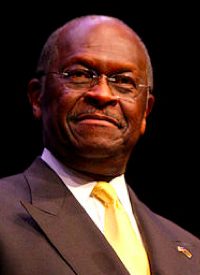
Cain’s declaration prompted some to wonder whether he would pull himself out of the race for a Republican presidential nomination, but Cain’s campaign manager Mark Block indicates that he simply meant he was conducting a “strategic reassessment” and “not a reassessment of withdrawing” from the race.
According to Block, Cain will be outlining the specifics of that strategic assessment during his campaign stop in Dayton, Ohio, where Cain will “lay out his way forward.” When asked if Cain would drop out of the race under any specific circumstances, Block answered that there are only two things that would prompt Cain to leave the race: “Mrs. Cain, and if we show up to do an event and no one is there.”
Block’s spin on Cain’s statement seems to reflect an entirely different sentiment than that articulated by Cain, who said in his conference call to his staffers that the latest allegations against him “is cause for reassessment…. We have to do an assessment as to whether or not this is going to create too much of a cloud in some peoples’ minds as to whether or not they should support us going forward.”
The New York Times reported yesterday, “[Cain] denied having had a romantic relationship, but advisers said he wanted time to gauge the reaction of supporters and contributors, as well as to see whether his family preferred that he leave the race.”
Cain also gave cause for speculation over the possibility of his leaving the race. “It’s also taken a toll on my wife and my family, as you would imagine,” Cain told staff members and a few big supporters on a campaign conference call. “The public will have to decide whether they believe her or whether they believe me. That’s why we’re going to give it some time, to see what type of response we get from our supporters.”
During his appearance on Tuesday at Hillsdale College in Michigan, however, Cain appeared optimistic as he told attendees, “Life can be a challenge. Life can seem impossible. It’s never easy when there’s so much on the line. But you can make a difference.”
Cain’s failure to provide details or address audience concerns regarding the latest scandal seemed to negatively impact his appearance at the college, however. The New York Times writes, “Mr. Cain did not receive the enthusiastic response he once drew on the campaign trail. There were no ovations or chants of his name. At times, the applause seemed only polite.”
While there is clearly some confusion and mixed signals from the Cain campaign over the future of Cain’s presidential bid, some are already pondering the effects that a Cain dropout would have on the race.
According to the New York Times’ Jim Rutenberg, Cain’s departure would help boost Newt Gingrich. “Newt has profited the most from Cain’s recent decline, and would sure benefit from Cain’s exit,” wrote Rutenberg.
But the Washington Examiner’s Phillip Klein believes that a Cain dropout would actually help Mitt Romney because “it could lead to a greater focus on Gingrich’s messy personal life.” Reminding readers that Gingrich has had three marriages and multiple extramarital affairs, Klein asserts that in the wake of Cain’s departure, “expect to hear a lot more about Romney’s 42-year marriage to emphasize that this isn’t an issue Republicans would have to worry about should he be the nominee.”
Chris Cillizza and Aaron Blake of the Washington Post disagree. They contend that while it is hard to predict who will actually benefit from Cain’s departure, it is certain that Romney will in fact be hurt by it. As Romney has maintained 20 to 25 percent of GOP support, he has failed to win indecisive conservatives, and his best hope rested with the possibility that those indecisive conservatives will split their vote among a number of other candidates, dubbed the “non-Romneys.” As that field shrinks, all the other non-Romneys grow stronger, and Romney’s support weakens.
A recent Public Policy Polling survey asked those whose first choice is Cain who their second choice for the nomination would be. A whopping 37 percent chose Newt Gingrich, while 14 percent selected Bachmann, 13 percent opted for Romney, and 12 percent indicated Rick Perry.
Amongst Iowa voters, however, the numbers change, with just 24 percent flocking to Gingrich, and a surprising 22 percent to Bachmann, prompting the Christian Science Monitor to wonder whether a Cain dropout would “resurrect Bachmann’s Iowa chances.”
Photo: Herman Cain


